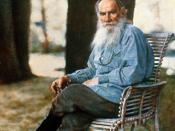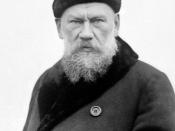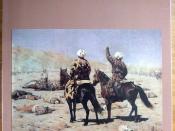Search for the Meaning of Life Throughout our lives at one point or another each one of us questions what is the meaning of life. Is death the ultimate end? Many of us wonder if there is an after life of some sort, or is life over after we die? Many turn to religion for the answers. People look to religion as "the solution to some sort of problem that life sets us." With this dilemma comes many other questions of what the meaning of life is? If this is the ultimate end, should we live it to the fullest? And if there is an afterlife do we live our lives based on what may happen during our afterlife? Many philosophers have expressed their views on this question, amongst which was the famous philosopher Tolstoy. According to Tolstoy death is annihilation. Tolstoy's views can be compared to the beliefs of Buddha. Buddha believed in an afterlife. In this paper, we are going to be discussing Tolstoy's dilemma and his conclusions, while comparing them to Buddha's views. Throughout his life, Tolstoy consistently questioned himself "Why? What's the point in anything I'm doing?" (26-28). Tolstoy's moments of perplexity came during his late forty's. No one would have been able to look at him and guess that he felt as if his life was going nowhere. His life was filled with happiness, which also brought the feeling of emptiness. He had a wife who he loved and who loved him back, "good children, and a large estate that without much effort improved and increased." He had everything that anyone else would have wanted. Somewhere deep down inside he could not figure out what the point in all this was. What was the purpose of his own life? Tolstoy began to feel bothered when he realized that everything good that he had was one day going to come to an end. The fact that he had nothing problematic in his life started to make him feel as if someone was playing a joke on him. He felt as if all this could not be right and there was no purpose for him to live. That is when he started to contemplate suicide. He was surprised by the fact that it took him so long to realize this. He beloved that he was standing on a summit of life from where he was, "Seeing clearly that there is nothing in life, and that there has been and will be nothing. And he was amused." He believed that no matter what he had now in life, would sooner or later have no meaning because eventually he would not exist anymore. Everything about him would be forgotten. Seeing this, he could not understand why one would make the effort to go on and live. Why not just end it all right now when it will all end one day anyways? All he could see was each and every move of his being one-step closer to death.
Tolstoy felt that he was trying to cover up the truth by attempting to believe the fables that he had been told throughout his life. He was told, "You can not understand that meaning of life, so do not think about it, but live." He felt that he could no longer go along with his idea, for he had been doing it for too long. He believed that he had used his family and writing as a reason for living. He believed that, "The two drops of honey which diverted my eyes from the cruel truth than the rest: my love of family, and of writing""art as I called it""were no longer sweet to me." The reason he believed this was that his family was human as well, and one day they will come to an end, and so will he. He started to question why he should support them any longer. He felt that they should feel the same despair he did, or live in stupidity as the rest. Therefore, he believed there was no point in human life and that one day all of their efforts would come to an end through death.
Tolstoy's views were drastically different compared to those of Buddha. Buddha believed in reincarnation. He believed that there was life after death. Buddha did not believe that once a human dies that life is over. He believed that there was a reason for living life. He saw that the purpose of life was to work towards achieving Nirvana. Nirvana can be described as reaching complete and utter most wisdom without self-interest. He believed that humans live and die for as many times as it takes in order for them to reach the enlightened stage of Nirvana.
Buddha believed that suffering comes from desire and the only way that humans can live free of suffering is by releasing themselves from those desires. He saw life as a process of purification. This process could take longer for one person than the other. A person is given a certain amount of time in one life to reach Nirvana, and then if it is not reached that life is taken away and they are then given another chance by receiving another life. This process goes on as long as is needed until the person has truly reached Nirvana and has become pure.
The pathway to Nirvana can be attained through the four noble truths. The first noble truth is understanding the universality of suffering. The second noble truth is to have the desire to have and control things, which cause, suffering. In other words, it is to understand what desire is and then want to control it, if it causes suffering. The third noble truth is to completely get rid of suffering by getting rid of those desires. Finally, the fourth noble truth is to become perfect as far as understanding, speech, thinking, mindfulness, and concentration. Only after attaining all if these can one reach Nirvana.
When comparing the views of Buddha and Tolstoy, one can see that they disagree on many things. If Buddha were given the chance to analyze Tolstoy's beliefs, he would probably just think that he is still extremely attached to self-desires, and that is why he felt that there was no reason for living. Buddha would have probably thought that Tolstoy did not know how to handle not wanting to desire anything anymore, and that is why he became so negative. Tolstoy already had everything that he could ever want and now had nothing else to desire, that is why he thought life was no longer worth living especially since it was going to come to "annihilation". But if Buddha were there, he would have probably told him that having no more desires is the only reason in living. He would explain to him that once you reach the point where you have no more desires, that is when you say that you have fulfilled you purpose for living and now can look forward to death rather than dreading it because now you can reach Nirvana. If Tolstoy could just see that Nirvana was the ultimate goal in life for after death, he would have felt better about it than he actually did. Therefore, Buddha would be right for telling Tolstoy his beliefs because; it would open the door for him to see a brighter outlook on life. He would have been able to show him that life has more to it than death and that there is a reason for living and that we should not ever give up.
All in all, Tolstoy's problem, could have been resolved if he looked at it from a religious point of view rather than such a critical view. Buddha's view showed to be more positive and tended to make life look better, whereas Tolstoy's view was very negative and made life look pointless. Both seemed to want to describe the meaning of life, but for some reason came up with completely different definitions. Tolstoy eventually came up with his own solution, which was having faith in his own interpretations. He finally realized that God was someone who was looking out for him and giving him love and his life meaning. Although he still did not seem to agree with Buddha, in a way he had an enlightenment of his own.





